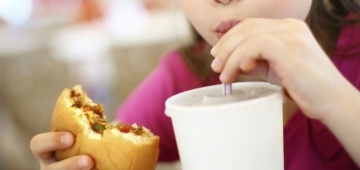
Dr Erica Gadsby, Senior Research Fellow at the University of Kent, discusses how the media’s focus on obesity is obscuring another concern affecting children in our poorer households: that of hunger.
I’ve been distinctly unsettled since reading the recent report, Hungry Holidays, from the All Party Parliamentary Group (APPG) on Hunger and Food Poverty (June 2017), which stated that:
“Up to an estimated three million children risk being hungry in the school holidays”.
The report followed a two-month evidence gathering process that included 52 written submissions from a wide range of individuals and organisation representatives, and two panels of expert witnesses who contributed oral evidence.
The links between obesity and poverty are, of course, well evidenced. In the UK, the poorer people are, the worse their diet (Mwatsama and Stewart 2005) – a situation that seems to be worsening, with the poorest 10% of households purchasing increasingly less fruit and vegetables and more meat pies, burgers, meat-based ready meals and chips between 2007 and 2011 (SMCPC 2013:88).
Yet even knowing this, there is a degree of cognitive dissonance created when being confronted with the stark reality of hunger amongst children when much of my work as a public health researcher focuses on obesity and how to prevent it.
Childhood obesity is a topic that is rarely out of the news. Indeed, the government’s long-awaited ‘plan for action’ on Childhood Obesity was released in January this year. But the plan disappointed many, and fell a long way short of the recommendations prioritised within the Health Select Committee report Childhood Obesity – brave and bold action – as highlighted by The King’s Fund’s David Buck in his blog post.
Perhaps unsurprisingly, neither the government’s plan for action, nor the Health Select Committee report mention the issue of holiday hunger which, as the APPG point out, remains largely hidden. Nor do they mention poverty. It is worth noting however, that the word ‘choice’ appears 10 times in the very short plan for action. To me, this suggests that there may be a lack of ‘whole systems’ thinking going on.
It stands to reason that children who usually receive free school meals during term time – particularly those whose entitlement is triggered by low household income, rather than through the universal offer of free school meals for infants – are likely to be those at greatest risk of being hungry during school holidays.
But evidence reviewed by the APPG suggests that children whose parents work for low wages, but who are not entitled to free school meals, are similarly vulnerable to hunger during the school holidays. School holidays can have a significant impact on family finances – the APPG report estimated that the loss of free school meals for two months adds between £30 and £40 a week to parents’ outgoings for one child.
Frank Field MP, who chaired the APPG on hunger, is presenting a backbench bill to provide free meals to poorer children in the holidays, and the bill has broad cross-party support from more than 100 MPs. However, as a presentation bill (a type of private member’s bill proposed by backbenchers without government support), it has very little chance of becoming law.
I recently spent some time (as part of my Open University studies on using systems tools for managing change) examining the Hungry Holidays report to draw out the statements and considerations offered up by the contributors who provided evidence. I analysed the content of the report using the general principles and some of the key ideas of SODA (Strategic Options Development and Analysis), a systems tool for working on complex problems.
From this analysis, I identified the goals, strategies and actions that the various contributors to the report identified for improving the holiday hunger situation. I found that clusters of issues emerged around children’s physical health (such as improving the quality of diet, reducing the risk of malnutrition, reducing diet-related health inequalities), and the health and wellbeing of both children and their parents (including reducing the isolation that some children and parents feel in the school holidays, and ensuring that children arrive back as school prepared to learn).
It is clear that an approach to tackling holiday hunger must think beyond the immediate provision of food. Systems tools like SODA can help to bring different perspectives to the surface, and can help to develop a deeper understanding of the issues.
Understanding the situation from the perspective of a parent on a very low income, for example, highlights the difficult choices for parents in this situation – particularly around how to re-arrange household budgets – and the negative consequences of some of the actions that might be taken by a struggling parent (such as buying cheaper food, and compromising on nutrition).
A key strategic direction is to help to address the underlying issues that low-income families face. This could be through providing financial support to families in poverty, signposting families to other support services, making support services for vulnerable parents more available during school holidays, and improving local amenities in areas of higher deprivation. Such actions would help to reduce the isolation that some children and parents feel in the school holidays, and reduce the impact on parents of increased costs of school holidays.
My SODA analysis highlighted that a key potential action for eradicating the threat of hunger is to co-ordinate the various organisations providing food and other activities to children who might otherwise be hungry. This would help to ensure that provision for holiday hunger might be more consistent and responsive to need, and that disadvantaged children might have more opportunities to have fun and take part in activities over the holidays.
The goals identified in my analysis of the report – to improve the health, wellbeing and life chances of children, and to improve the health and wellbeing of parents in poverty – are closely aligned with any local authority’s health and wellbeing goals. Without waiting for national government action, perhaps it is incumbent on all councils to make a strategic commitment to tackling holiday hunger and to co-ordinating the various organisations currently doing their best to provide food and activities to children during the holidays.



